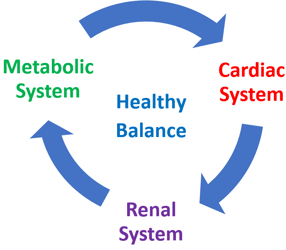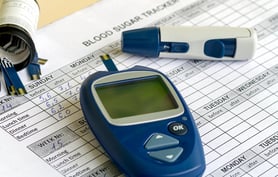In the United States, the prevalence of type 2 diabetes is 32.6 million or one in ten Americans. These numbers are expected to continue to rise.
The Relationships
 Diabetes is a disease of the metabolic system. The metabolic system is closely related to the circulatory system which includes the cardiac (heart) and renal (kidneys) systems. These systems work together to achieve a healthy balance in the body. The heart is one of the most metabolically demanding organs in the body. It is sensitive to changes in energy demands and volume (fluid) status. The kidneys rely on the heart for adequate blood flow as well as the metabolic system for the hormones that help to maintain them. In addition, the metabolic system relies on the circulation for hormonal activation.
Diabetes is a disease of the metabolic system. The metabolic system is closely related to the circulatory system which includes the cardiac (heart) and renal (kidneys) systems. These systems work together to achieve a healthy balance in the body. The heart is one of the most metabolically demanding organs in the body. It is sensitive to changes in energy demands and volume (fluid) status. The kidneys rely on the heart for adequate blood flow as well as the metabolic system for the hormones that help to maintain them. In addition, the metabolic system relies on the circulation for hormonal activation.
As a result, diabetes, kidney disease and cardiovascular disease are three conditions that often develop simultaneously. Compared to patients without diabetes, those with diabetes are two to four times more likely to experience cardiovascular events, such as a heart attack or stroke, and more likely to have worse outcomes after these events. About half of all diabetes related fatalities can be attributed to cardiovascular disease. Diabetic kidney disease affects almost 40% of patients with diabetes and is the leading cause of end stage renal disease.
Uncontrolled T2DM Can Worsen CVD & CKD
 Uncontrolled type 2 diabetes contributes to worsening cardiovascular disease; leading to heart attacks, strokes and chronic kidney disease. Multiple studies have shown that these complications will occur within the first five years of developing diabetes. Therefore, the better a diabetic’s blood sugars are controlled within this five year span, the less likely he or she will develop a lifelong debilitating disease.
Uncontrolled type 2 diabetes contributes to worsening cardiovascular disease; leading to heart attacks, strokes and chronic kidney disease. Multiple studies have shown that these complications will occur within the first five years of developing diabetes. Therefore, the better a diabetic’s blood sugars are controlled within this five year span, the less likely he or she will develop a lifelong debilitating disease.
Benefits of Medication
Good diabetic control is important to prevent further complications. In addition, some medications have proved useful. Multiple studies have clearly established the benefit of several specific medications. ACEI1 and ARBs2 are the most commonly used medications that have cardio-renal protective properties. These are commonly used in diabetics to help prevent cardiac and renal complications. Their benefits have been known for over 30 years. Through more recent research, it has been found that other groups such as SGLT2 inhibitors3, GLP-1 receptor agonists4 and selective nonsteroidal MR antagonists5 have also been shown to have cardiac and kidney protective benefits that surpass the benefits of ACEI/ARB alone. This highlights the importance of research to continually investigate new medications to address the complex complications of diabetes.
Chase Medical Research
As a clinical research site for over 20 years, Chase Medical Research has been involved with these new developments that have lead to FDA approvals. We are currently participating with a number of pharmaceutical companies searching for even more innovative compounds that will lead to longer and healthier lives for all diabetics.
Glossary
- ACEI (Angiotensin-converting-enzyme inhibitors) also called ACE inhibitors, are a group of blood pressure medications which include medications such as lisinopril and enalapril. These are part of the standard treatment for kidney disease.
- ARB (angiotensin receptor blockers) are a group of blood pressure medications which include medications such as losartan and olmesartan. These are part of the standard treatment for kidney disease.
- SGLT2 inhibitors (sodium-glucose cotransporter 2 inhibitors) a newer group of diabetic medications which include medications such as empagliflozin (Jardiance), dapagliflozin (Farxiga) and canagliflozin (Invokana)
- GLP-1 receptor agonists (glucagon-like peptide receptor agonists) a group of diabetes medications that are also approved for use in weight loss. Examples include dulaglutide (Trulicity) and semaglutide (Ozempic)
- Selective nonsteroidal MR antagonists (selective nonsteroidal mineralocorticoid receptor agonists)- a new group of medications currently under study to determine all their benefits. They have been found to be beneficial to those with kidney disease and diabetes. Finerenone is an example of this type of medication.
References:
- Usman, Khan, Butler. “The Interplay Between Diabetes, Cardiovascular Disease and Kidney Disease” | ADA, 2021.
Share This Post
Recent Posts
- The Relationship Between Obesity and Obstructive Sleep Apnea February 1 2022
- Cardiovascular Outcome Clinical Trials February 1 2022
- Diabetic Peripheral Neuropathic Pain February 1 2022
- Are All Types of Cholesterol Bad? February 1 2022
- Blood Pressure: The Highs, the Lows, and Everything in Between February 1 2022
Categories
- Clinical Trials
- Cardiovascular Disease
- Diabetes
- Obesity
- Kidney Disease
- Hypertension
- Pain Management
- Vaccine
- Cholesterol
- Chronic Obstructive Pulmonary Disease
- Diabetic Peripheral Neuropathy
- Migraine
- Osteoarthritis
- Biologics
- COVID-19
- Gastroesophageal Reflux Disease
- Irritable Bowel Syndrome with Constipation
- Lyme Disease
- Nonalcoholic Steatohepatitis
- Respiratory Syncytial Virus


